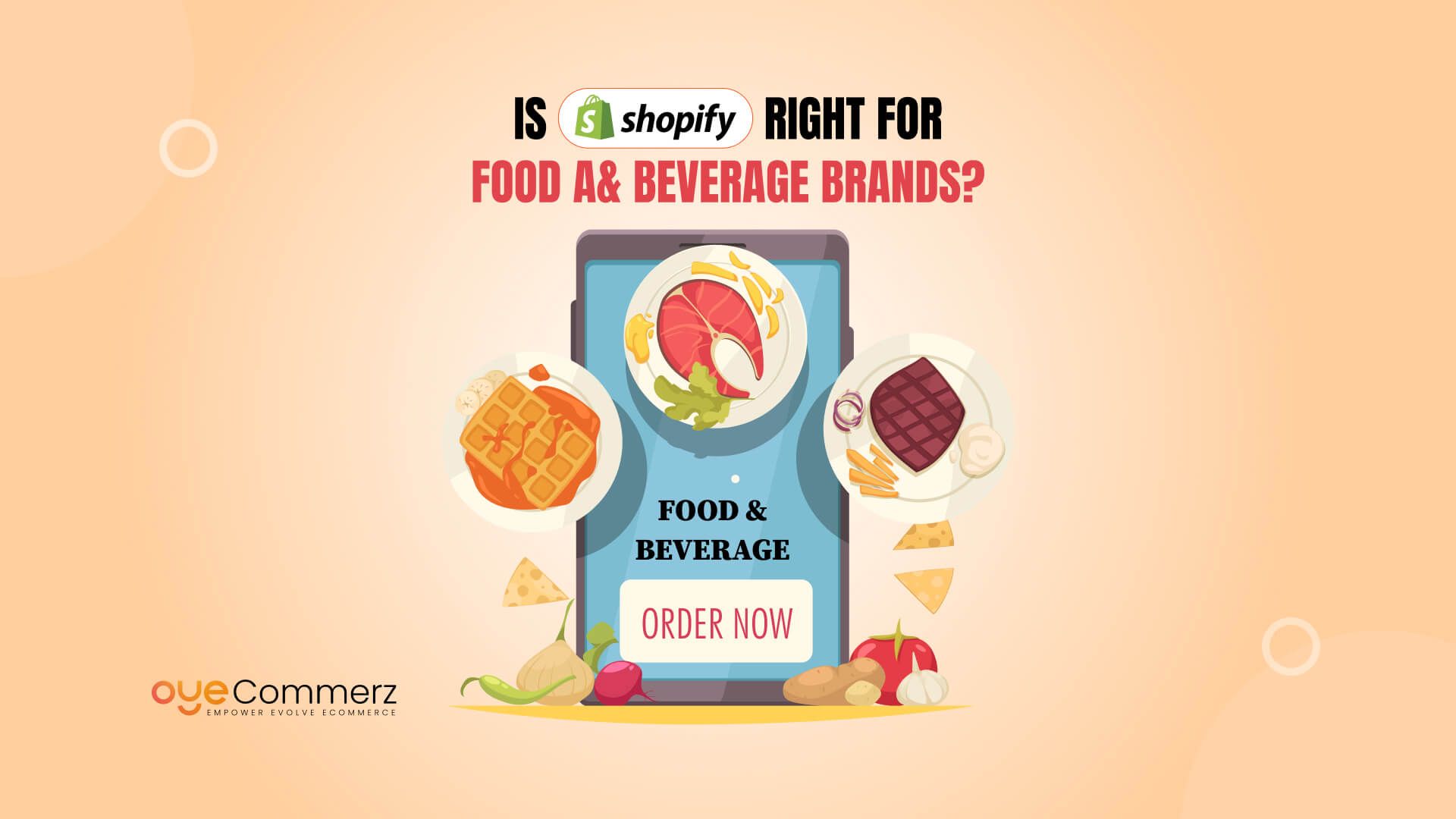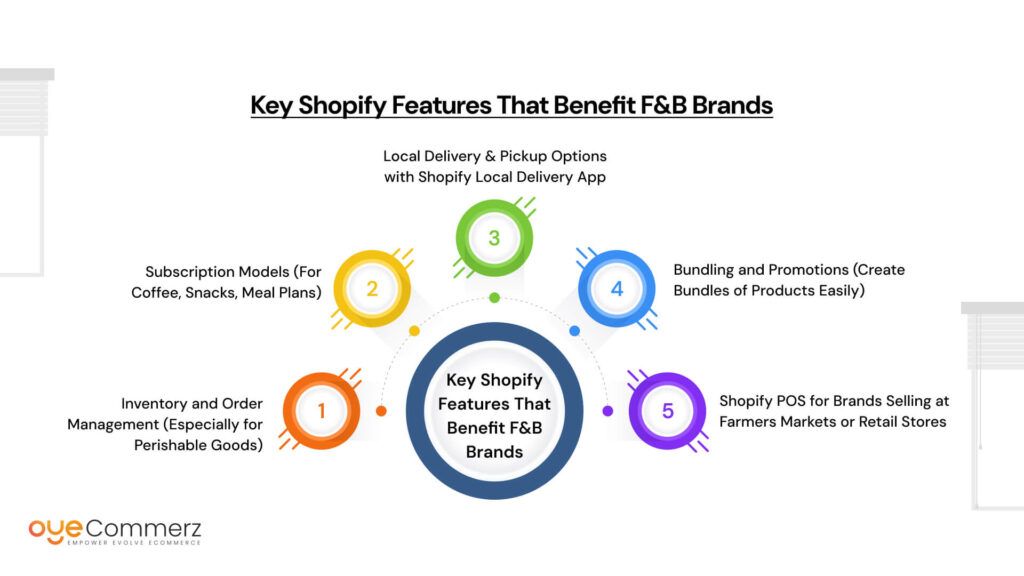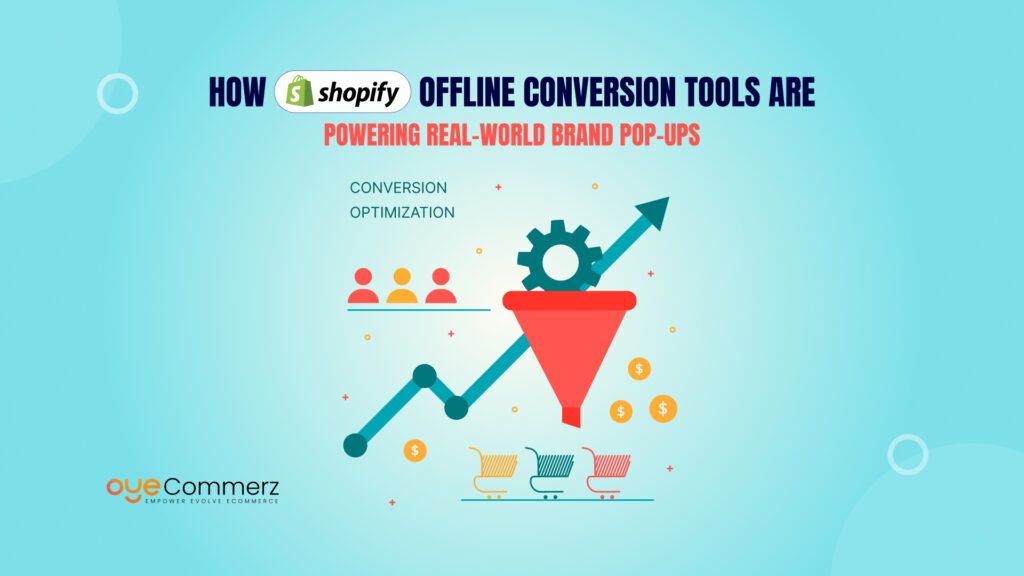Thinking about selling your food or beverage products online but not sure if Shopify is the right fit?
With more U.S. consumers buying directly from brands than ever before, the food & beverage eCommerce market is booming. From coffee subscriptions to specialty snacks, direct to consumer (DTC) is reshaping how people shop.
Choosing the right platform is critical and Shopify is one of the top contenders. But is it built to handle the unique needs of F&B businesses?
Let’s explore what makes Shopify a strong choice and what you should consider before getting started.
Table of Contents
ToggleThe U.S. Food & Beverage Market is Going Digital
The way Americans shop for food has fundamentally changed. What began as a necessity during the COVID-19 pandemic has now become a permanent shift in consumer behavior. Food and beverage (F&B) brands across the U.S. are embracing digital channels not just to survive but to thrive.
Online Grocery and Meal Kits on the Rise
- In March 2025, U.S. online grocery sales reached $9.7 billion, marking a 21% year over year increase and the eighth consecutive month with sales exceeding $9.5 billion.
- Meal kit services like HelloFresh, Blue Apron, and Factor_ have seen a significant uptick in subscriptions, especially among younger, convenience-driven consumers.
- 70% of U.S. consumers say they now buy at least some groceries online, a trend expected to continue even as physical stores remain open.
Growth in Snacks and Specialty Foods
- Direct-to-consumer (DTC) brands in the snack and specialty food categories have seen explosive growth.
- Shoppers are turning to online platforms to discover artisanal, organic, keto-friendly, and plant-based snacks that might not be widely available in local supermarkets.
- Platforms like Thrive Market and SnackMagic have capitalized on these niche preferences by offering curated online selections.
Changing Consumer Behavior Post-Pandemic
- Consumers now expect convenience, speed, and customization in how they shop for food.
- Mobile grocery shopping has become mainstream, with apps like Instacart, Amazon Fresh, and Walmart+ dominating the space.
- There’s a growing demand for transparency from nutritional information to sourcing details driving the need for content-rich product pages and authentic brand storytelling online.
Why a Strong eCommerce Presence Is Essential for F&B Brands
- Wider Reach: With shoppers no longer limited to local store shelves, brands can reach national or even global audiences.
- Stronger Margins: Selling DTC allows brands to bypass retailers and control pricing, margins, and customer experience.
- First-Party Data Access: Unlike traditional retail, eCommerce enables brands to collect valuable customer insights, which can drive better marketing and product development.
- Resilience: A robust digital infrastructure can protect against disruptions to physical retail from supply chain issues to economic downturns.
F&B brands that fail to adapt to the digital shift risk being left behind. Whether it’s investing in a Shopify powered storefront, optimizing for mobile commerce, or leveraging subscription models, going digital is no longer optional, it’s critical.
What Makes Shopify a Popular Choice?
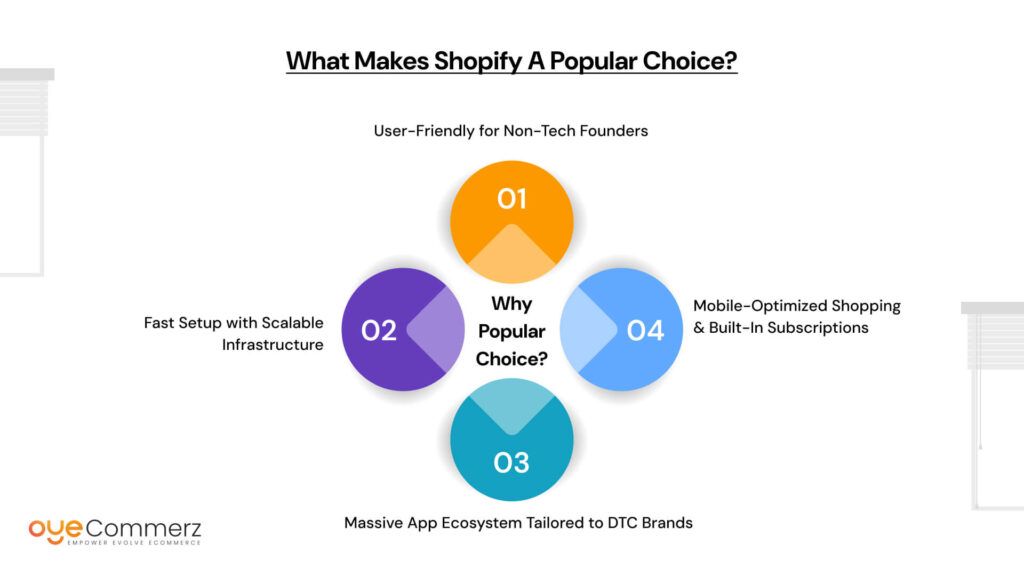
1. User-Friendly for Non-Tech Founders
One of Shopify’s biggest strengths is its accessibility. Many founders, especially those without a technical background, can create, manage, and grow an online store without needing any coding skills. Shopify provides a drag-and-drop interface and pre-built themes, meaning store owners don’t have to rely on developers to make their site look and function well. The platform also offers extensive tutorials, guides, and 24/7 customer support to assist non-tech founders every step of the way.
2. Fast Setup with Scalable Infrastructure
Shopify is designed to get your store up and running quickly. Setting up a store on Shopify can take as little as a few hours, and it’s very easy to customize your store’s design and functionality. Once the store is live, Shopify’s infrastructure is scalable, meaning that it can grow with your business. Whether you’re handling a few orders a day or thousands, Shopify’s robust system ensures your website won’t slow down, giving you peace of mind even during peak shopping seasons or growth spurts.
3. Massive App Ecosystem Tailored to DTC Brands
Shopify has a vast ecosystem of apps and integrations that make it easy to expand the capabilities of your store. For direct-to-consumer (DTC) brands, this is especially valuable. The Shopify App Store offers apps for everything, from inventory management, customer support, and email marketing to advanced analytics, upsell tools, and social media integrations. With so many options available, businesses can easily find the right tools to automate processes, improve customer experience, and optimize marketing efforts.
This flexibility is perfect for growing businesses that need custom solutions without having to build everything from scratch.
4. Mobile-Optimized Shopping & Built-In Subscriptions
Today’s consumers are increasingly shopping from their mobile devices, and Shopify ensures that stores are mobile-optimized by default. Shopify themes are designed to automatically adjust for mobile screens, ensuring a seamless shopping experience on any device.
Moreover, Shopify includes features like Shop Pay, which speeds up the checkout process, and it also supports subscription-based models, where businesses can offer recurring payments for products or services. This makes it easier for merchants to build customer loyalty and increase lifetime value.
These features are particularly helpful for e-commerce businesses looking to compete in a mobile-first, subscription-driven world.
Key Shopify Features That Benefit F&B Brands
1. Inventory and Order Management (Especially for Perishable Goods)
Managing inventory for F&B brands, especially with perishable goods, can be a logistical challenge. Shopify provides robust inventory management tools that allow businesses to track stock levels in real time, set up low-stock alerts, and manage stock across multiple locations. For perishable goods, Shopify allows businesses to create custom product variants based on expiration dates or batch numbers, ensuring that products are sold within their shelf life. This helps prevent waste and ensures the smooth operation of inventory for F&B brands.
2. Subscription Models (For Coffee, Snacks, Meal Plans)
Subscription-based models are increasingly popular in the F&B industry, particularly for products like coffee, snacks, and meal plans. Shopify makes it easy for businesses to set up recurring orders, allowing customers to sign up for regular deliveries of their favorite items. The platform offers several subscription apps, such as ReCharge, that seamlessly integrate with your store to handle billing, renewals, and customer management. This model not only boosts customer loyalty but also generates steady revenue streams.
3. Local Delivery & Pickup Options with Shopify Local Delivery App
For F&B brands that cater to local customers, providing delivery and pickup options is essential. The Shopify Local Delivery app allows businesses to offer local delivery services, helping them to serve their customers more efficiently while maintaining control over shipping costs. It also allows for easy setup of pickup options, allowing customers to order online and collect their products directly from a store or designated pickup point. This is particularly useful for local eateries, cafes, and small-batch producers who want to enhance convenience for their customers.
4. Bundling and Promotions (Create Bundles of Products Easily)
Shopify offers tools that make it easy to create product bundles, allowing F&B brands to group related products together. For example, a coffee brand could bundle different coffee blends with a custom mug, or a snack brand might bundle multiple snack items for a discounted price. Bundling products not only helps to increase average order value but also makes it easier for customers to purchase multiple items in one go. You can also set up promotional discounts, flash sales, and time-limited offers to further incentivize purchases, helping to drive sales and create a sense of urgency.
5. Shopify POS for Brands Selling at Farmers Markets or Retail Stores
For F&B brands that sell in physical locations such as farmers’ markets or retail stores, Shopify’s Point of Sale (POS) system is great. Shopify POS integrates directly with the online store, so inventory is synced across both online and offline channels. It allows businesses to accept payments, issue receipts, and manage sales both in-store and on the go. The POS system is simple to use, making it easy for businesses to manage orders at events or pop-up shops without any complicated setups. It’s an ideal solution for F&B brands that want to bridge the gap between their physical and online presence.
Challenges F&B Brands Might Face on Shopify
1. Regulatory Hurdles (Labeling, Shipping Alcohol, State-by-State Food Laws)
F&B brands, especially those dealing with alcohol, dairy, or perishable foods, must navigate a complex web of regulations that vary by region. In the U.S., for example, alcohol sales are heavily regulated at the state level, and certain states have stricter rules regarding labeling and shipping of food products. Shopify itself doesn’t offer built-in tools to handle these compliance issues, so F&B brands need to be proactive in ensuring their products meet local, state, and national requirements. This might involve integrating third-party apps or working with legal experts to make sure everything, from product labeling to shipping policies, is in line with regulations.
2. Shipping Perishables – Limited Built-in Cold Chain Solutions
Shipping perishable items presents significant logistical challenges. While Shopify integrates with many shipping carriers, it doesn’t provide out-of-the-box cold chain solutions for maintaining the temperature of perishable goods during transit. F&B brands selling perishable items like fresh produce, meat, dairy, or baked goods will need to partner with third-party shipping providers or fulfill cold chain needs through custom solutions. Shopify does allow integration with some apps for refrigerated shipping, but businesses must ensure their chosen logistics partners can handle the specific needs of shipping perishables to maintain product quality and safety.
3. Complex Tax Rules for Food Items Across U.S. States
Sales tax laws for food items can vary drastically between U.S. states. Some states may have exemptions for certain food products, while others may tax them at different rates or require specific reporting. This can make tax compliance a headache for F&B brands that sell in multiple states. While Shopify has built-in tools to calculate taxes, the platform’s standard tax settings may not account for the nuances of state-by-state tax laws for food and beverage items. Brands may need to use third-party apps or work with tax professionals to ensure they’re charging the correct amount of tax and staying compliant with local tax laws.
4. Custom Fulfillment Needs (May Require Third-Party Logistics Apps or Custom Development)
F&B brands often have unique fulfillment needs that go beyond the standard order processing workflows. For instance, many F&B products require specific storage conditions, special packaging, or specific handling processes. Shopify’s native fulfillment options might not always meet these needs, particularly for brands that require complex logistics for perishable goods or multi-location fulfillment. As a result, many F&B brands will need to integrate third-party logistics (3PL) apps or work with custom development to manage their order fulfillment processes. This could involve setting up specialized workflows for things like temperature-controlled shipments, inventory management for multiple fulfillment centers, or advanced packaging options for fragile or sensitive products.
When Shopify Might Not Be the Best Fit
1. If You’re a Restaurant Looking More for Dine-In Ordering/Delivery Functionality
While Shopify is a great platform for e-commerce, it is primarily designed for online sales rather than managing dine-in or table service orders. Restaurants looking to integrate features like real-time table reservations, full menu management, or complex point-of-sale (POS) systems that cater specifically to in-person dining or delivery services may find Shopify’s capabilities limited. Though Shopify does support local pickup and delivery for online orders, it does not offer the kind of specialized features you would find in restaurant management systems, such as those designed for order-taking, menu adjustments, or real-time customer interactions in a dining environment. For restaurants, dedicated restaurant POS systems (like Toast, Square for Restaurants, or Lightspeed) might be a better fit.
2. Extremely Complex Wholesale Operations (Might Need ERP-Level Systems)
While Shopify does offer basic wholesale functionalities through apps like Wholesale Channel or integrations with third-party systems, it may not be sufficient for businesses with complex wholesale needs. For example, brands that handle large volumes of wholesale transactions, customized pricing models for different clients, bulk ordering, inventory management across multiple warehouses, or complex B2B contracts might require the advanced features found in Enterprise Resource Planning (ERP) systems. ERP systems are designed to streamline and integrate critical business processes, such as financials, supply chain management, and customer relationships, and provide far more control over intricate wholesale operations.
For large-scale wholesale operations, Shopify might be too simplistic, and businesses may need to look into more robust ERP systems like SAP, Oracle, or Microsoft Dynamics.
3. Brands Requiring Ultra-Custom Logistics or Temperature-Sensitive Shipping Workflows
Shopify’s native shipping and fulfillment features, while robust, may not support the ultra-specific needs of brands that require complex logistics setups or very precise shipping workflows. This is particularly relevant for F&B brands that deal with temperature-sensitive or fragile products. For instance, a brand shipping perishable goods such as fresh seafood, ice cream, or pharmaceuticals may need to create a customized cold chain solution that Shopify doesn’t provide out of the box.
Shopify does integrate with certain third-party apps and logistics providers that support refrigerated shipping, but for businesses with highly specialized needs or those who need to develop a unique fulfillment system, a more tailored platform or solution may be necessary. Custom-built solutions or specialized logistics software might be a better option for those requiring high control over temperature, timing, and other aspects of the shipping process.
Tips for Making Shopify Work for Your F&B Brand
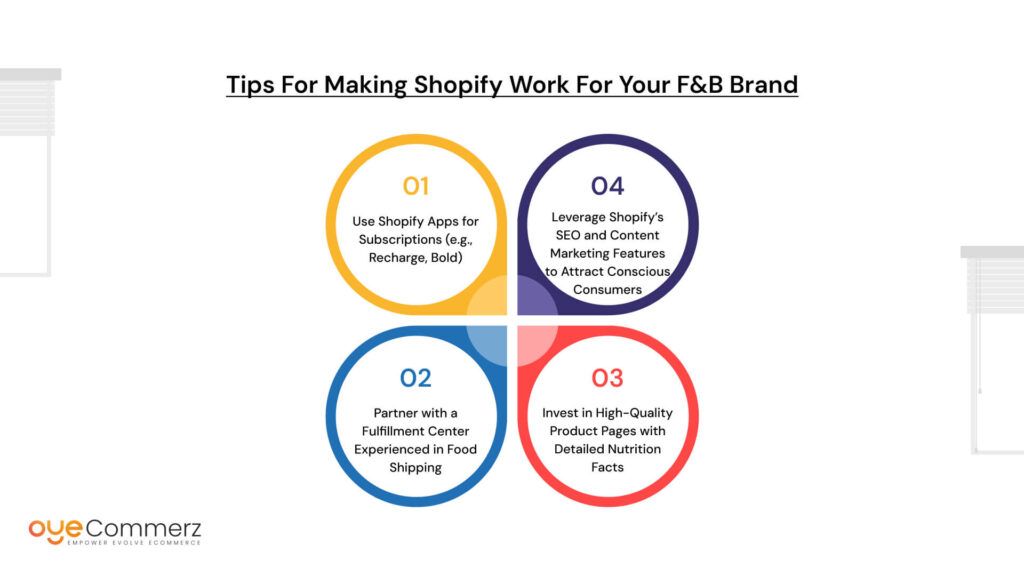
1. Use Shopify Apps for Subscriptions (e.g., Recharge, Bold)
Subscriptions are an excellent revenue model for F&B brands, whether you’re offering coffee, meal kits, snacks, or beverage products. Shopify has several powerful subscription apps like Recharge and Bold Subscriptions, which allow customers to easily sign up for recurring deliveries. These apps integrate smoothly with your store, offering features like customizable billing cycles, discounts for subscribers, and easy management of customer preferences. By offering a subscription option, you can increase customer retention, ensure steady cash flow, and keep your customers coming back regularly.
2. Partner with a Fulfillment Center Experienced in Food Shipping
For F&B brands, especially those dealing with perishables, partnering with a reliable fulfillment center is crucial. Shopify integrates with a variety of third-party logistics (3PL) providers that can handle everything from inventory management to order fulfillment. Make sure you choose a fulfillment center with experience in food shipping, as they will understand the nuances of temperature control, packaging requirements, and the speed necessary to get your products to customers while keeping them fresh. Some fulfillment centers specialize in food products and can offer cold chain logistics for perishable goods, which is essential for maintaining product quality.
3. Invest in High-Quality Product Pages with Detailed Nutrition Facts
The success of an F&B brand often hinges on how well customers can understand the products they’re purchasing. Detailed product pages with high-quality images, descriptions, and, importantly, nutrition facts can greatly enhance customer trust and sales. Clearly showcasing ingredients, calorie counts, allergens, and other health-related information helps consumers make informed decisions, which is particularly important for health-conscious buyers or those with dietary restrictions. Shopify’s product page customization options allow you to design pages that present this information clearly and attractively, helping to reduce hesitation and boost conversions.
4. Leverage Shopify’s SEO and Content Marketing Features to Attract Conscious Consumers
Shopify offers robust SEO tools that allow you to optimize your product pages, blog posts, and other content to rank higher in search engines. This is key to attracting conscious consumers who may be actively searching for sustainable, ethical, or health-focused products. Leverage Shopify’s built-in SEO features by optimizing your product descriptions, including relevant keywords, creating content about sustainability or health benefits, and writing informative blog posts. You can also make use of Shopify’s integration with social media to promote your values and product offerings. Engaging with conscious consumers and showing the ethical or environmental impact of your brand can help create a loyal customer base that is driven by your values.
Get Your F&B Brand Started on Shopify Today!
Ready to take your F&B brand to the next level with Shopify? Get in touch with us for a free consultation or a personalized Shopify demo tailored to your specific needs. At Oyecommerz, we specialize in helping F&B brands grow on Shopify, ensuring compliance with industry standards while delivering an exceptional customer experience. Whether you’re looking to streamline your e-commerce operations or launch a subscription model, our team is here to guide you every step of the way.
Contact us today to see how we can help you succeed on Shopify!
Contact to Migrate your Site to Shopify Now
Final Verdict: Is Shopify Right for You?
Shopify is ideal for small to mid-sized food and beverage (F&B) businesses, especially those focused on direct-to-consumer sales like subscriptions, meal kits, or local delivery. With the help of Shopify apps for subscriptions (like Recharge or Bold) and local delivery, you can easily enhance your store’s functionality. Shopify is also great for businesses looking for quick setup and seamless integration between online and offline sales through its POS system. However, if your business requires highly custom logistics, complex wholesale operations, or dine-in features, you might need a more specialized platform. Before committing, consider how Shopify apps and features fit your specific needs and budget to ensure it’s the right choice for your F&B business.
Frequently Asked Questions
Yes, Shopify is a great platform for selling food products online. Many F&B brands use it to sell packaged goods like snacks, coffee, beverages, and meal kits. It supports inventory management, product bundling, subscriptions, and more making it ideal for food businesses.
Shopify can be used by restaurants to sell merchandise, packaged food items, meal kits, or offer local delivery. However, it’s not designed for traditional dine-in ordering or table management. Restaurants focused on online ordering or takeaway may benefit, but for dine-in service, platforms like Toast or Square for Restaurants may be better suited.
Yes, you can sell food items on Shopify, including perishable and non-perishable goods. Just ensure you comply with local food safety regulations and labeling laws. Shopify also supports apps for managing subscriptions, delivery, and nutrition details to streamline your operations.
Shopify can handle local food delivery with the help of apps like Shopify Local Delivery, Zapiet, or Onfleet. While it’s not a full-fledged food delivery platform like Uber Eats, it’s great for businesses offering direct-to-consumer delivery of packaged meals, baked goods, or grocery items.

